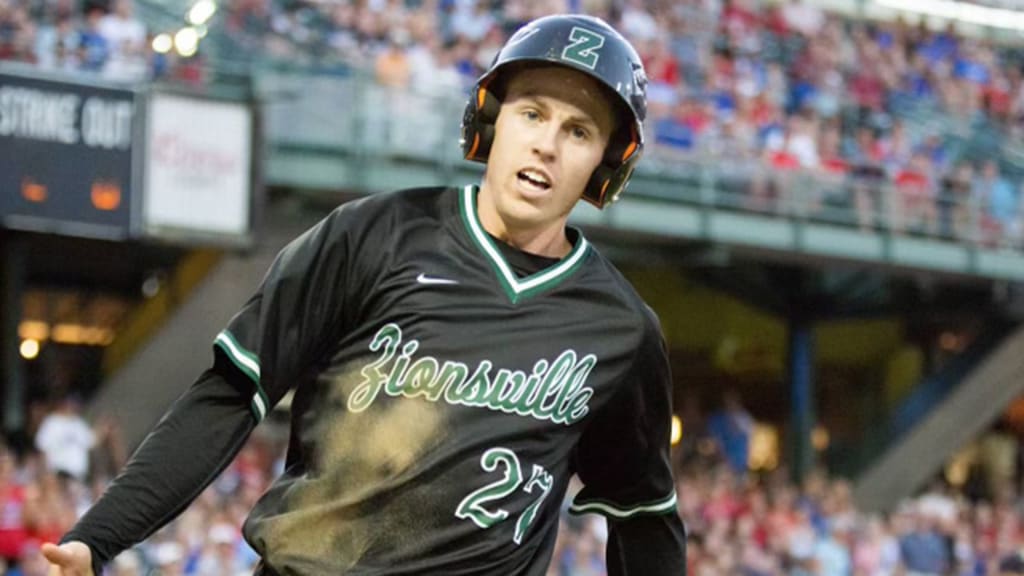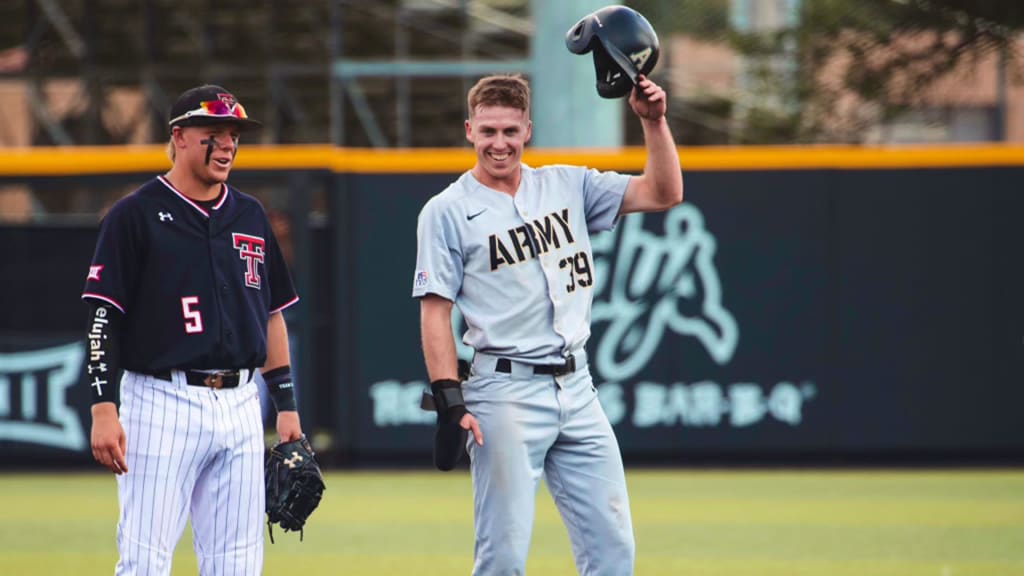Jacob Hurtubise graduated from the United States Military Academy in June. After scaled-down commencement exercises -- mandatory quarantine, no families in attendance -- the West Point Class of 2020 began service obligations around the world.
Hurtubise, a second lieutenant from Zionsville, Ind., has a unique assignment next month.
Minor League camp with the Cincinnati Reds.
Hurtubise (pronounced HURT-a-bees) is the first service academy graduate to sign with a Major League club since the enactment of a 2019 Department of Defense policy permitting cadets to delay active duty while playing pro sports.
The military granted waivers to Hurtubise and fellow West Point graduates Cole Christiansen (Los Angeles Chargers), Elijah Riley (Philadelphia Eagles) and Connor Slomka (Jacksonville Jaguars) in the NFL, as well as Zac McGraw (Portland Timbers) in Major League Soccer.
“We’re still kind of serving, in a way,” Hurtubise said in a recent interview with MLB.com. “It’s not the active duty service you see most of my classmates participating in, but we still have an obligation to represent ourselves and to represent the military. There’s not a lot of people on active duty that are going to get the same spotlight as [pro athletes] are.
“The way we represent ourselves can be just as valuable to creating that bond between the civilian side and the military, and making sure there’s trust within that bond. That’s one of the big things we talk about at West Point: How do we create that bond between the military and civilian sectors? We take great pride and great responsibility in the positions we hold, because of where we come from and what we represent.”
Hurtubise, 23, is a speedy center fielder who made history at West Point, establishing Patriot League records for career stolen bases and walks even before Army’s 2020 season was halted by the COVID-19 pandemic after only five games.
Hurtubise filed his waiver application with the military before completing his degree in operations research and branching air defense artillery. The application was approved in the days leading up to the June 13 graduation ceremony, contingent on one final component: A professional baseball contract.
Hurtubise wasn’t selected during the 2020 MLB Draft, shortened to five rounds because of the pandemic. He graduated two days after the Draft concluded and pondered his future on the 12-hour, overnight drive home to Indiana.
He arrived in Zionsville at 7 a.m. on June 14. Free agency opened two hours later for Draft-eligible players.
His phone came alive.
“I slept for two hours,” he recalled. “Right when 9 o’clock hit, I had three teams calling my phone to wake me up. That’s a pretty good way to wake up if you’re not getting a lot of sleep.
“It was definitely one of those moments: ‘Wow, this is happening.’ I didn’t go back to bed after that.”
Over the following days, Hurtubise and his agents, Steve and Jason Comte, narrowed the options to the Cubs, Indians and Reds. Emotionally, the Cubs’ appeal would be difficult to match. They were Hurtubise’s favorite team since childhood. As a plebe, he stayed up late in his dormitory room and watched them win the 2016 World Series -- risking a dreaded curfew violation in the process.
But then came a call from C.J. Gillman, the former Air Force Academy assistant coach who’d recently become the Reds’ Minor League hitting coordinator. Gillman told Hurtubise how miserable it had been to face Army -- because of Hurtubise’s irrepressible speed and all-out play. Gillman was back into recruiting mode, and Hurtubise loved what he heard about Cincinnati’s organizational values and offensive approach.
By the time Hurtubise hung up, he wanted to sign with the Reds.
“My whole family was like, ‘Aw, you’re choosing the Reds over the Cubs?!’” Hurtubise recalled with a smile. “But I have to do what’s best for me and my future in this game. The Reds seemed like the perfect fit.”

With his contract in hand, Hurtubise’s waiver application was approved. Procedurally, the hard parts were over. Hurtubise was beginning his pro career with a deep love for -- and obligation to -- the alma mater he’d represent with every swing on the field and sentence in the clubhouse.
But even a West Point degree, and all the physical and mental training behind it, could not insulate Hurtubise from the doubt that lingers for virtually everyone in the sport.
Am I really good enough?
He wasn’t from a baseball hotbed like California or Florida. He hadn’t proven himself in the Pac-12 or SEC. Months had passed since his last competitive at-bat.
Hurtubise spent last summer working at an Amazon warehouse in Indiana. One day, his phone rang. Eric Lee, the Reds’ senior director of player development, was on the other end.
Lee told Hurtubise that the Reds would host an Instructional League program at their complex in Goodyear, Ariz., beginning in late September.
And he was invited.
“My heart was like, ‘I’m going to play baseball again!’” Hurtubise beamed, playfully tapping his chest. “That was my immediate reaction. Obviously, without hesitation, I accepted to go down to Arizona.
“It was so awesome. … Being on the field with guys my age, just the whole team atmosphere. That’s something I quickly realized is part of the reason why I love playing the game: Being with my teammates and the competition, the 1-on-1 battles of you against the pitcher. There’s nothing better.”
Hurtubise’s career statistics at Army -- 105 stolen bases, 0 home runs -- foretold how he’d make a lasting impression during Instructional League. A left-handed hitter, he pulled a ground ball through the right side, an ordinary single in almost any context. Not this time. Hurtubise noticed the right fielder wasn’t charging the ball, so he took an aggressive turn at first and beat the throw on a close play at second.
The sequence affirmed to Hurtubise that he belonged in pro baseball. His teammates and bosses took note, too. If Hurtubise is to join former Blue Jays right-hander Chris Rowley as the only West Point graduates to reach the Majors, it will be because of plays like that -- a blend of contact skills, baserunning savvy and smoldering intensity. In describing his own style of play, Hurtubise is fond of saying, “If my jersey’s not dirty, I did something wrong.”
“He runs with reckless abandon, and you see the way that can affect a game,” said Shawn Pender, the Reds’ vice president of player development. “I know he was proud of that play, going from first to second. It was amazing to see what that did to our dugout.
“Our young players recognized that Jacob is very fast, but that play was about attitude and pressuring the defense. He was going to force someone on the other team to stop him. That’s how you play the game the right way. Jacob is always looking for ways to help his team, and because of that, he makes it easier for us to focus on baserunning.
“It isn’t just about speed. It’s more than that. It’s about the motor. His motor can affect people in a positive way. He made plays like that three or four times [last fall].”

Pender was equally impressed by something Hurtubise said during a meeting for Cincinnati’s Minor Leaguers on diversity and inclusion. At one point, the presentation paused in order for participants to share reflections on an issue of extraordinary importance within baseball and the country.
A reluctant silence followed. The player-led discussion included young adults of different races, backgrounds and countries of origin. The trepidation of being the first to speak in an open forum -- of saying something awkward -- was palpable.
“You needed someone to move the conversation forward,” Pender said. “It had to come from a player. Jacob was there.
“He looked around and realized that some of the younger guys felt a little shy. They didn’t want to be the first one to talk. He recognized that and said, ‘I can share some of my experience here.’ That broke the ice. Then, he stood back and let other people talk. That’s a sign of maturity. He certainly has that.”
Hurtubise’s background was an obvious point of curiosity for his Instructional League teammates, who called him “LT” in honor of his military rank.
“They were calling me Colonel,” Hurtubise said, laughing. “I was like, ‘Man, you guys are really promoting me.’ Depending on how well I was doing that game, they would give me promotions. I would always start out as LT. I would move up to Captain, Major, Colonel. It was a fun little game they’d play with me.”
While Hurtubise is a first-generation member of the military, he’s a second-generation collegiate athlete: His father, François Hurtubise, is from Montréal and came to the United States on a golf scholarship at Indiana University, where he met his wife, Lisa. The couple have two sons; Alec, 25, is high-functioning autistic and plays basketball, softball and hockey through Special Olympics.
Jacob is reminded of his future active duty whenever his phone pings with text messages or emails from classmates stationed around the world. Hurtubise said he chose West Point chiefly because of a desire to serve others. He’s committed to that ideal even as he wears a Reds uniform instead of fatigues. And he realizes that others before him didn’t have the same opportunity. Red Sox pitching prospect Noah Song, a U.S. Naval Academy graduate, has remained on active duty because he signed a pro contract before the waiver became available.
Hurtubise also thinks about Maj. Stephen Reich, the revered figure in Army baseball history who owns the program record for strikeouts in a seven-inning game (17), set against Air Force in 1992. Reich appeared in two professional games as a Baltimore Orioles Minor Leaguer before being called back to active duty. He was killed in action 16 years ago in Afghanistan.
When people thank Hurtubise for his military service, he’s not always sure how to respond.
“I haven’t done anything yet,” he said. “I thank the people that have done something, that have gone overseas, that have served and protected our country. I guess it’s always implied [toward me], ‘Thank you for your future service,’ but the real heroes are the ones who have gone and done it so far. Those are the people we thank.
“ … Now that I have classmates getting deployed and starting to serve in the capacity we all anticipate after graduating, those are the people I look up to. I have great expectations for my future service and what I’m going to be doing for our country. I’ll say, ‘Don’t thank me yet,’ but I always appreciate people looking out, because I do have friends and classmates who are serving.”
The military mindset involves individual and collective goals, amid the possibility of future promotion. Hurtubise will hear similar words in a very different setting next month. As he arrives at his first Spring Training, he’ll bring a singular background -- and the same dream.
